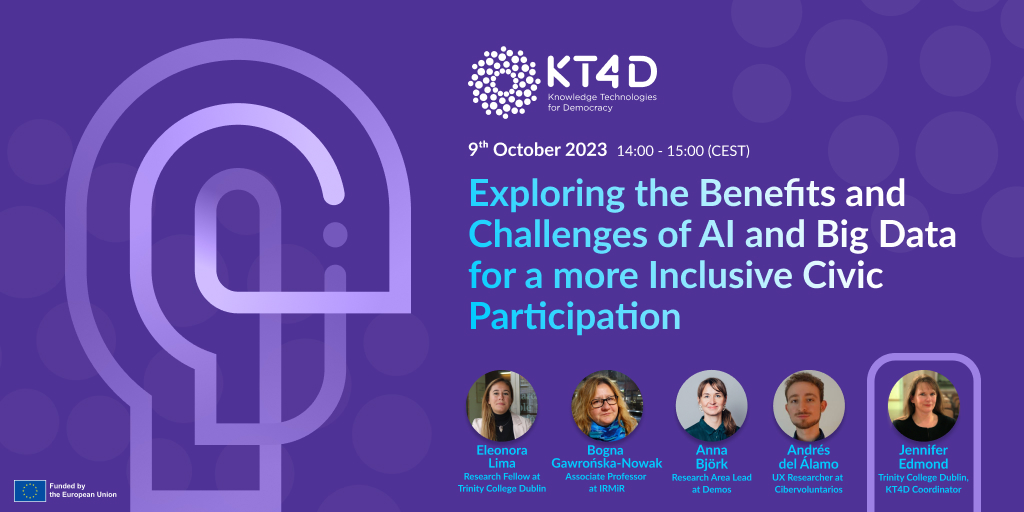Webinar: Exploring the Benefits and Challenges of AI and Big Data for a more Inclusive Civic Participation

Synopsis
In an era where Artificial Intelligence (AI) and Big Data have become inseparable from our daily lives, their influence on democratic governance is profound. These technologies hold the potential to revolutionise the way societies engage in democratic processes, making governance more accessible, efficient, and responsive to people's needs. However, they also present unique challenges, including issues of bias, privacy, and transparency, which must be addressed to ensure a fair and inclusive democracy. The Knowledge Technologies for Democracy (KT4D) project recognises both the promise and the pitfalls of AI and Big Data in democratic societies. At its core, KT4D is dedicated to harnessing the power of these Knowledge Technologies in a human-centric and ethical manner, promoting technology that truly serves the interests of the people while respecting their rights and values. Join us in this first KT4D webinar where we explore how KT4D is connecting with its stakeholders to promote technology design that prioritises human well-being, inclusivity, ethical and democratic principles.
Agenda
Time | Title | Speaker |
| 14:00 - 14:10 | Opening remarks: Exploring the core objectives and mission of KT4D & Unveiling the KT4D approach to the challenges society faces | Jennifer Edmond, Associate Professor of Digital Humanities and Director of Strategic Projects for the Faculty of Arts, Humanities and Social Sciences in Trinity College Dublin, KT4D Coordinator & Webinar Moderator |
| 14:10 - 14:20 | KT4D Use Case in Brussels: “Regulatory tools and Services for Policy & CSOs” | Anna Björk, Research Area Lead at Demos |
| 14:20 - 14:30 | Use Case in Madrid: “Capacity Building Services for Citizens and Citizen-Facing CSOs” | Andres del Álamo Cienfuegos, Digital Anthropologist , UX researcher, sociologist, project manager at Fundación Cibervoluntarios |
| 14:30 - 14:40 | Use Case in Warsaw: “Capacity Building Services for Citizens and Citizen-Facing CSOs” | Bogna Gawrońska-Nowak, Associate Professor at Institute of Urban and Regional Development in Warsaw |
| 14:40 - 14:50 | Use Case in Dublin: “Improving self-awareness in academic and industrial software development” | Eleonora Lima, Research Fellow in Digital Humanities at Trinity College Dublin |
| 14:50 - 15:00 | Q&A, Interactive Discussion & Closing Remarks |